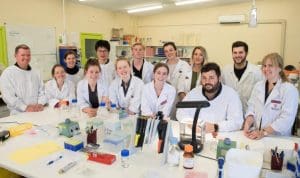
Murdoch University veterinary students at WA department labs.
WESTERN Australian veterinary students are being given an insight into livestock biosecurity issues through a joint training and engagement initiative.
Final-year veterinary students and Western Australia’s biosecurity status are expected to benefit from the initiative coordinated by the Department of Primary Industries and Regional Development and the College of Veterinary Medicine, Murdoch University.
Department veterinary pathologist Shane Besier said it was vital that companion animal and livestock vets understood the important role they would play in protecting Australia’s animal health and where they could access biosecurity expertise when needed.
“The department regularly works with the School of Veterinary and Life Sciences at Murdoch University to assist with biosecurity and veterinary pathology information for students.
“We recognised; however, that final-year vet students would benefit from a more holistic understanding of how the department supports animal health with biosecurity and diagnostic expertise,” Dr Besier said.
“While many of these students will not work with livestock every day, companion animal vets may see new and emerging diseases in wildlife or diseases in companion animals that can also affect livestock.
“As part of the training, students are introduced to the roles of department vets, especially the support our veterinary pathologists can provide when newly graduated vets are confronted with an unfamiliar animal disease situation,” he said.
“Following a tour of the department’s laboratory, the students participate in a large animal necropsy at Murdoch University under the supervision of Murdoch University Pathology Registrar Cynthia Robveille.”
Dr Besier said that ensuring the students were aware of the most effective sampling techniques for livestock or companion animals had four major benefits.
“First, they contribute to a rapid, accurate diagnosis.
“They also protect the vet, clients and consumers from zoonoses – diseases of animals that people can catch,” he said.
“Sound veterinary techniques also benefit individual producers by improving on-farm biosecurity and reducing disease spread between animals and between farms.
“And finally, the students learn how data from veterinary investigations support Western Australia and Australia’s excellent animal health status and protect our livestock industries’ access to domestic and export markets,” Dr Besier said.
Dr Besier said the student rotations would occur twice monthly during 2018.
“Initial feedback from the students has been very positive and we hope that exposure to the training will encourage the students to consider career paths that support WA’s livestock industries.”
For more information about how government works in partnership with producers, industry and the community to continually enhance WA’s biosecurity, see the Fit to Trade video on the department website agric.wa.gov.au.

Brilliant initiative, applaud the opportunity for vets to be informed and ready at the front line if the state ever incurs a biosecurity outbreak.